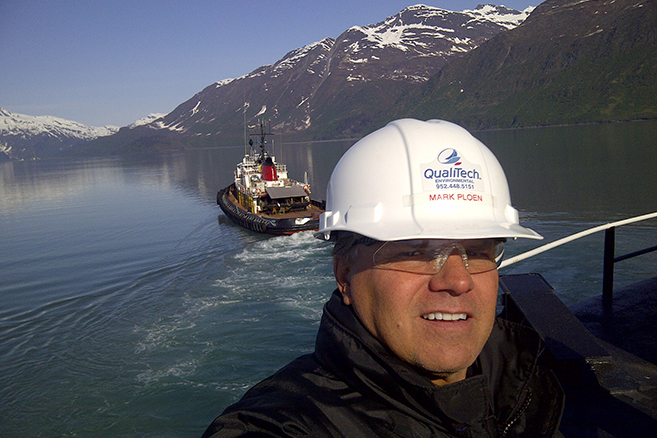

Mark Ploen was trained to draw straight lines, but you certainly can’t track his career path on one. His route from technical illustration and commercial design student to international oil spill cleanup and containment expert is more of an upward spiral.
Ploen followed his older brother, Jeff, to Bemidji State University in the early 1980s. When visiting, Mark enjoyed attending football and hockey games, loved the campus and knew the hunting and fishing would be good.
He was right about the outdoor opportunities. He counts the many early mornings spent waterfowl and grouse hunting among his favorite memories. He’s also grateful for lifelong friends he made during freshman year, like Brad Benson ’84.
“Like all of us, Mark knew how to have fun, but you could see that he was focused and driven, whether it be in school, hunting or fishing,” Benson said.
In addition to game, Ploen pursued the business degree he thought he would earn, but taking technical illustration and commercial design courses “just because he liked them” was one of his first unexpected turns.
The self-described “hands-on guy” remembers using a T-square to draw plans. Those classes introduced him to professors Dr. Kermit Anderson and the late Dr. Arthur Edlund, who advised him he might be better off working toward a degree in industrial education.
Ploen switched majors because the courses appealed to him and he appreciated the mentoring. Then his head was turned by friends returning from Alaska with stories of tuition money raised working in fisheries. He headed to the wilderness, a few credits shy of a degree.
His fishery job supported his hunting and fishing habits, but he soon realized big money was being made in the oil fields in Prudhoe Bay. He and his girlfriend, Arlette, who had moved with him from Bemidji, returned briefly to BSU before finding more permanent work in Alaska.
After applying at every large oil and service company, he was hired as a stick picker/grunt laborer for a small environmental services firm. He joined an industry busy drilling for oil in very sensitive surroundings.
“There was a lot of research being done on how to do things right — and if you did have a spill in those environments, how did you clean it up,” Ploen said. “So it was ‘right time, right place’ for that.”
He became the firm’s North Slope manager within about 18 months. When a Los Angeles firm purchased the company, he became their Alaska manager. His advancement coincided with a severe drop in oil prices, which led to a transfer to L.A. in late 1988. In March, the Exxon Valdez ran aground, and he went back up to Alaska to work under contract for Exxon for nine months.
“I was real close to getting out of the industry all together in the fall of 1988 … but the Exxon Valdez changed all that,” Ploen said.
The ensuing Oil Pollution Act of 1990 required companies to have oil spill response plans, equipment and expertise—and created a tremendous niche opportunity. Ploen hit the ground running for the next two years, consulting and selling equipment for his employer. In 1992, he decided if he were going to work at an exhausting pace, he would go to work for himself. Soon after, he opened QualiTech Environmental in Houston.
A few years later, his father’s estate planning prompted discussions about bringing his company into family-owned, Chaska-based QualiTech, Inc. Instead of merging businesses, Ploen and his father and brothers worked out an agreement to add QualiTech Environmental to the QualiTech organization. QualiTech Environmental continues to consult, train, sell equipment and integrate systems for oil spill prevention and cleanup. Ploen is majority owner and vice president of the division.
Ploen and Arlette, who married in 1991, were glad to move back to Minnesota, so they could be close to family and send their daughters, Saren and Marissa, to good schools.
“I tell people that was the best family decision I ever made in my life, but probably the worst financial decision,” Ploen said, “It’s definitely harder to manage an oil field service company from Minneapolis, where there are no oil fields, than it is in Houston.”
It still works, he said, because he is close to an airport and can get wherever he might need to be fairly quickly. In 2010, he was called on to lead cleanup on the Deepwater Horizon spill in the Gulf of Mexico. Emergency phone calls often whisk him away to either coast, the Gulf, North Dakota’s oil fields and overseas locations for extended periods of time. His firm’s expertise has even expanded beyond oil spills to assist in unique clean-up situations such as the recent Avian Flu crisis in Iowa.
According to Arlette, Ploen’s even-tempered work ethic and knowledge are just a few of the reasons he is so well respected in the industry. She credits Bemidji State for starting him in the right direction.
“His education was the key to opening many doors,” she said.
– By Maryhelen Chadwick
